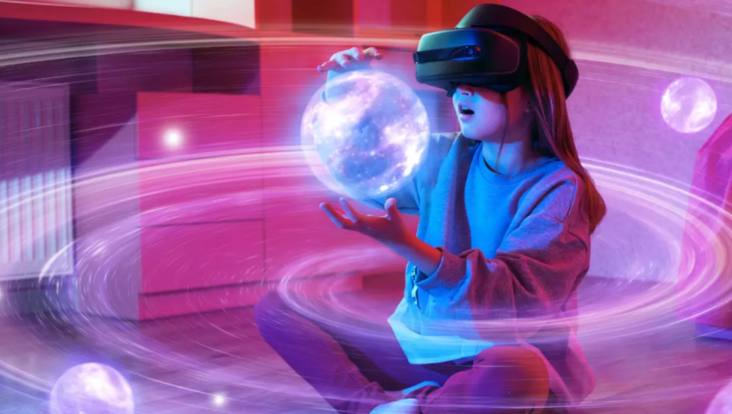
- Methods of education have not kept pace with advances in technology but the imperative of change is becoming more apparent.
- Virtual reality (VR) is being adopted more readily as the gains of experiential learning is being realised.
- VR is making education less conventional and advancing K-12, higher education and vocational training.
Education is the foundation of a strong economy. It increases human capital, drives productivity and boosts economic output.
For individuals, education paves the way to acquire new skills, develop critical thinking and analytical know-how, contribute to economic welfare, develop a sense of purpose and shape one’s career. Therefore, its impact on individuals, societies, governments and the world is undeniable. Yet methods to educate people have not always kept pace with technological developments. That said, change is imminent and will come faster over the next decade.
In fact, advancements have already been visible during the COVID-19 pandemic when governments were forced to close the doors of schools and universities worldwide for weeks at a time. The United Nations Educational, Scientific and Cultural Organization (UNESCO) supported the global education sector with digital tools, programmes and resources to ensure continuity of learning. Other countries around the world rolled out online educational tools such as Alef Education in the UAE, Vschool in KSA and MOE E-Learning in Egypt, to name a few.
Although these solutions were crucial, they mostly focused on transferring knowledge, not the practical and in-person experience students needed to grasp concepts. After all, while some learn through theory, others learn through practice. The evolution of educational technology going forward must thus address experiential learning. When coupled with innovative pedagogies, augmented reality, virtual reality (VR) and mixed reality are positioned to address this need and create a competitive advantage for all stakeholders involved.
Advancements in technology have penetrated most sectors and transformed them administratively or in service delivery. The transformation, however, still needs further technological advancements to disrupt education. These advancements’ infiltration of education systems has become an increasing imperative.
Disruption and innovation
The disruption we are seeing in today’s digitalizing world is helping increase accessibility, enhance quality and improve the affordability of education globally. Arguably these interventions are enough to drive transformative change. In addition, environmental pressures and COP26 goals (from the 2021 United Nations Climate Change Conference) will drive the digitalizing of education streams, where feasible and affordable, inside and outside the classroom, reducing the reliance on textbooks, notebooks and pencils as critical learning tools.
We need to adapt to an evolving landscape and nurture our younger generations to help outmatch our success. While schools and universities have been increasingly focused on personal development, some technologies can expedite the process. VR is a leading example and arguably a game-changer for the next generation of students, graduates and vocational learners and enables experiential learning.
It allows students to immerse themselves in an interactive experience where they can visualize their actions’ outcomes first-hand. Coupled with the metaverse, students and teachers can communicate and share while immersed, overcoming space and time limitations. Finally, they can consolidate previously acquired knowledge and apply skills acquired through conventional e-learning.

While research has shown that VR positively influences students’ learning outcomes, it can also improve student-teacher interactions through practical hybrid implementation, whether in or out of the classroom. With VR as a classroom tool, teachers can motivate students and create a more collaborative and interactive studying environment. VR can be integrated into traditional teaching to create a unique experience adapted to each student’s ability, style, pace and drive to learn, ensuring their readiness to advance through robust assessment.
Maximizing VR’s impact
VR supports more powerful visualization, improves educational interaction, enhances collaboration, strengthens students’ practical understanding, and delivers globally. Research and development must coincide with unlocking the maximum output and fully utilizing its benefits, as with any new technology.
It should be noted that VR does somewhat limit human interaction if not appropriately monitored and introduced with a guided programme and can cause isolation in younger generations. Still, with the proper research, developments and safeguards, the benefits of VR outweigh the risks. VR is a technology that can transform graduates’ skillsets immediately recognized through practical applications. Learning through play, first-hand experiences and applied knowledge creates a more appealing environment for students and results in much stronger skillsets.
Whether through VR or other experiential learning tools, educational technology is at a turning point for leaders, educators, regulators and other stakeholders to take a proactive approach to invest in future generations and ride the wave of change. We have started to see these plans pan out in national transformation plans, even in emerging economies such as the United Arab Emirates (UAE) and the Kingdom of Saudi Arabia. The UAE simulates the future through its recently inaugurated The Museum of the Future in Dubai, an architectural wonder.
The museum showcases an epic display of “Tomorrow Today” through augmented and virtual reality, visually demonstrating how technology reshapes our future and how our “Future Heroes” can learn through play and develop new skillsets.
As governments worldwide compete to be more resourceful and invest in social infrastructure, technologies such as VR are changing the status quo making education less conventional and advancing K-12, higher education and even vocational training. They are driven to improve outcomes and develop a more robust, better qualified and experienced workforce. These are the forces of change and we believe now is the time to act.



